Huangmei Opera: An operatic art that has evolved from the ballads sung by women while picking tea leaves


Huangmei opera, which originated in Huangmei in Hubei province, expanded in Anqing of Anhui province. It’s considered one of China’s five major operas together with Peking opera, Yueju opera, Pingju opera and Yuju opera.
The original Huangmei opera was sung by women when they were picking tea and the opera was called the Picking Tea Song. The arias of Huangmei opera are simple and smooth with rich expressiveness requiring detailed presentation.
On May 20, 2006, Huangmei opera was included in the first list of national intangible cultural heritages.
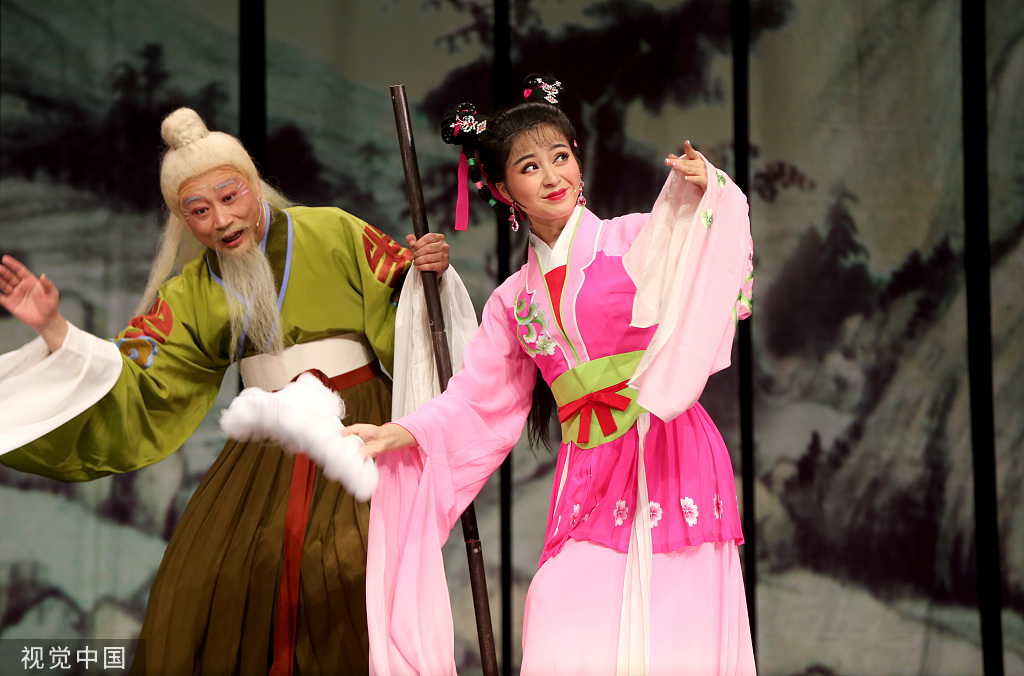
Origin
Huangmei opera dates back to the Tang Dynasty (618-907). It grew from the Picking Tea Song which was already popular at that time. Then, under the influence of folk ditties of the Song Dynasty and poetic dramas of the Yuan Dynasty (1271-1368), the rudiments of folk opera gradually came into being. Over the Ming (1368-1644) and Qing (1644-1911) dynasties, Huangmei opera became even more popular.
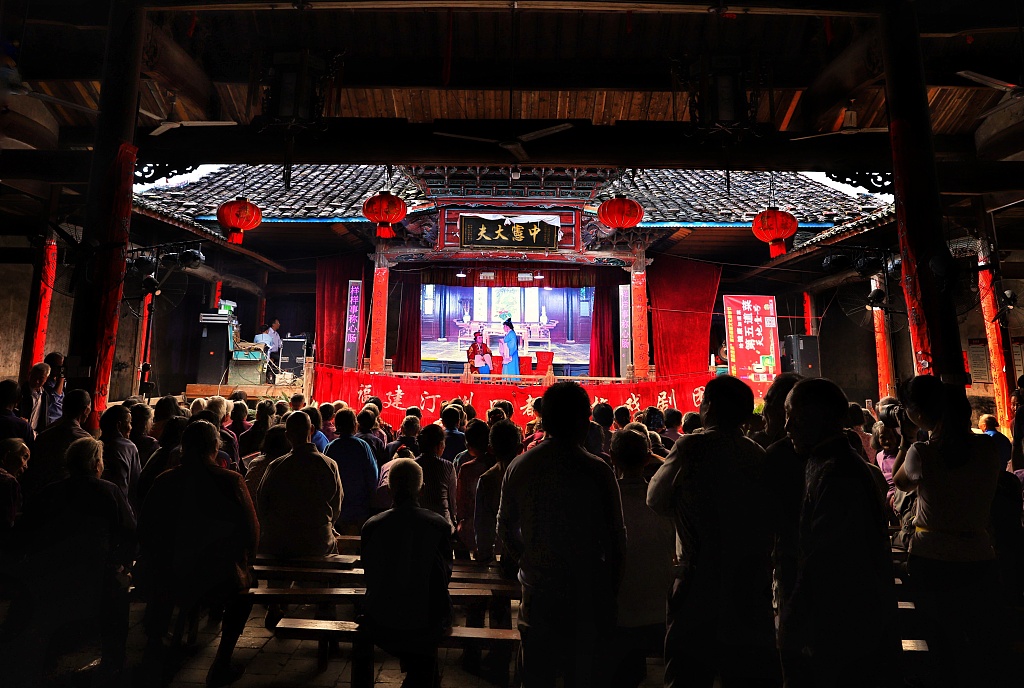
From the Qing Dynasty to the Revolution of 1911, Huangmei opera underwent further development, producing popular folk ditties in central and eastern China's Hubei, Jiangxi and Anhui provinces. Over time it has gone through several stages, including one-man shows, "three-role playlets" (a mini opera featuring the roles of Dan, Sheng and Chou), Sanda qichang (three performers playing percussion music while seven sing) and orchestral music accompaniment.
Tunes
The tunes of Huangmei opera have standard variations and are divided into three types: coloratura, Caiqiang and homophony. Huangmei opera is adept at expressing emotions and has lasting appeal. The arias are fine and smooth and show strong expressive powers. As they are easily understood, they are popular among the general public in all regions.
The coloratura melodies are simple, graceful, cheerful and light-hearted with characteristics of folk ditties. For example, they express a strong vitality of life. The coloratura of Huangmei opera, one of the main types, originated from folk songs. But now, they have transferred from the country to the stage, that’s to say, they have turned from vocal music into specific dramatic situations. Even though today’s minor coloratura are similar to folk songs, they have a lot in common with dramatic music.
The characteristic of coloratura in Huangme opera is that modes and tunes are bright and can express emotions in a simple way.
Concerning coloratura lyrics, they generally use fast-talking and a sense of humor to express emotions. The music of coloratura has a dynamic rhythm and a colloquial melodic contour. It conforms to the pitch tones of local dialect and emphasizes energy in language.
The coloratura of Huangmei opera have more than one hundred melodies from many places. For example, Lotus and Fengyang Song come from the north of China and Flower tunes come from the regions south of the Yangtze River. Language variations lead to changes of tunes.
Roles
The roles of Huangmei opera are developed on the basis of those in the two-role playlet and three-role playlet. The two-role playlet features roles of young handsome males (Xiaosheng) and young females (Xiaodan), while the three-role playlet features roles of young handsome males, young females), and a clown (Xiaochou). Gradually the opera divided its roles extensively into mature and married females (Zhengdan), middle aged or senior males (Zhengsheng), young females (Xiaodan), young handsome males (Xiaosheng), clowns (Xiaochou), and senior females (Laodan).
Previously, Huangmei opera theatrical troupes had semiprofessional players. But due to limited numbers, one actor generally had to play several roles. So, in Huangmei opera, there are strict standards for subdivision of roles, but not for actors.

Makeup
Huangmei opera pays special attention to eye and brow make-up. Compared with the use of thick ink as make-up for eye contours and gorgeous false faces in Peking opera, Huangmei opera devotes particular care to romantic charm. It’s similar to the authentic and unaffected make-up of noble women in ancient dynasties.
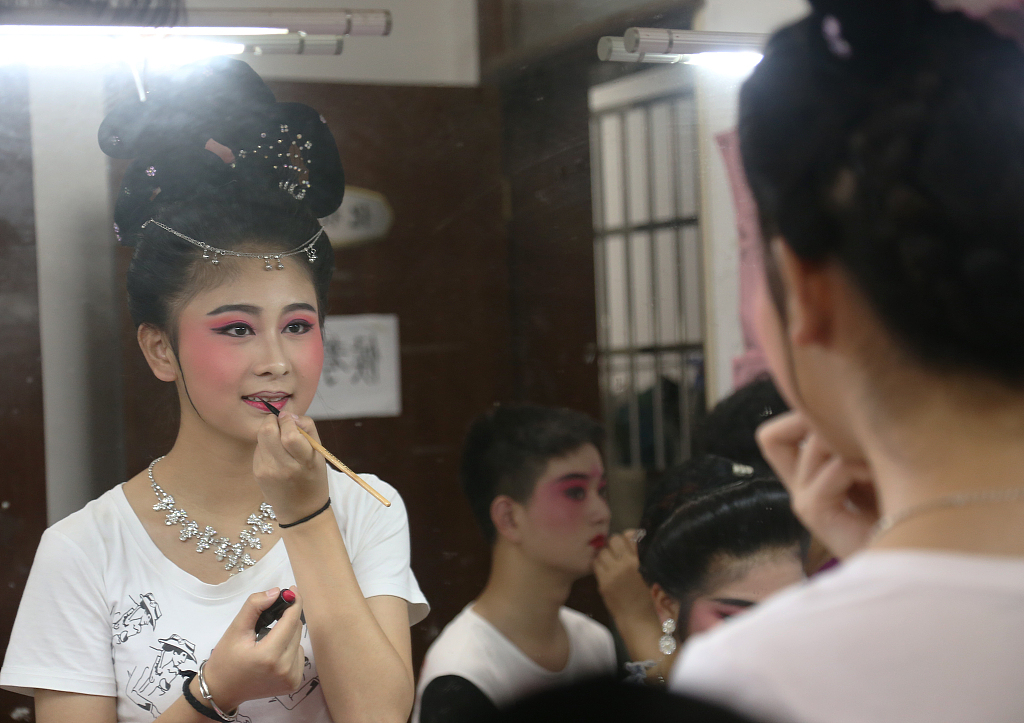
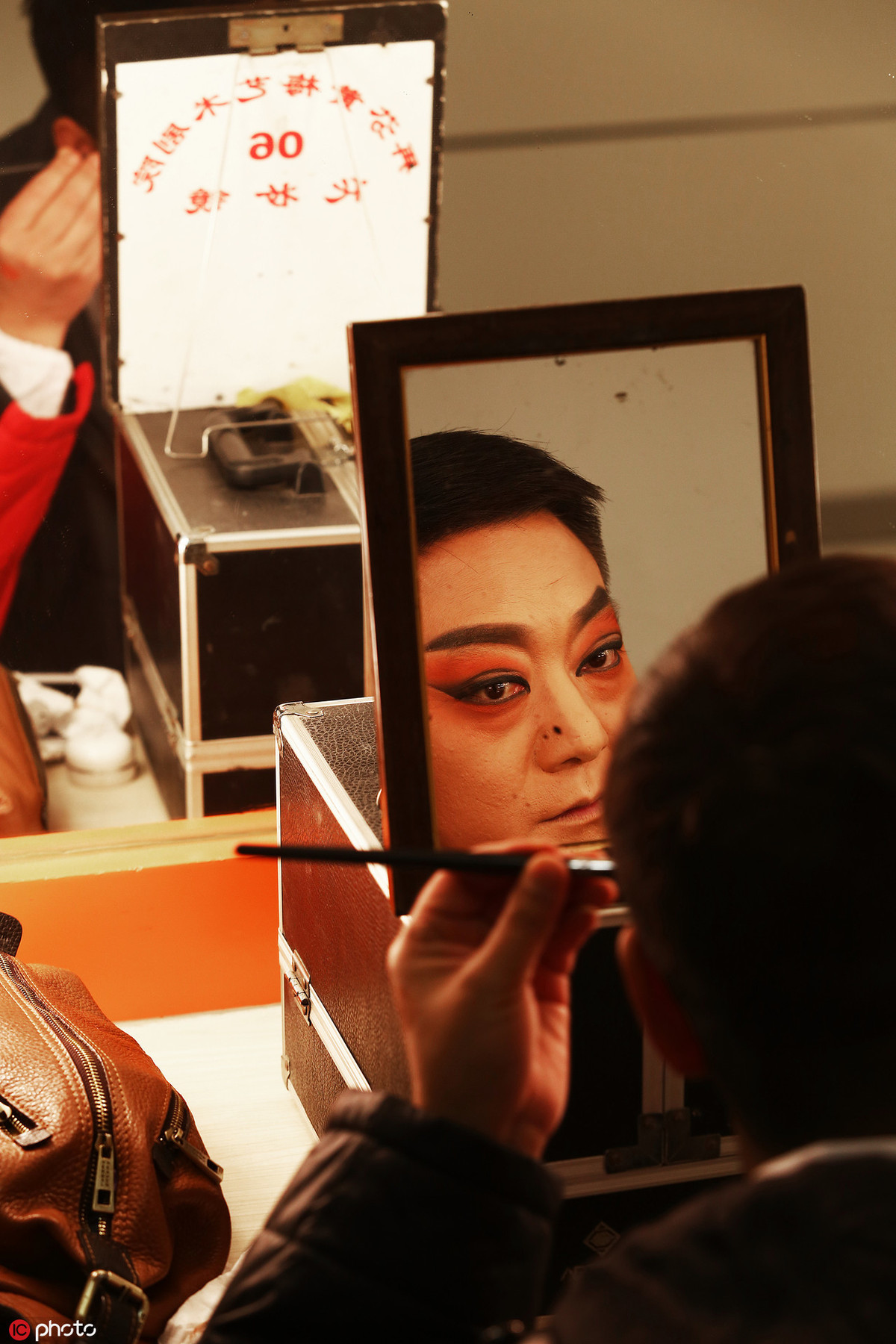
Musical Instruments
Originally, Huangmei opera only had percussion instruments for accompaniment. In the course of its development, several kinds of musical instruments were used to accompany Huangmei opera, but they did not spread on a large scale. After the foundation of the People’s Republic of China, a kind of high-pitched stringed instrument called Gaohu was used as the major accompaniment. And an increasing number of traditional folk instruments were also added for accompaniment including the Pipa lute, Chinese dulcimer, and flute. Besides, western instruments such as electronic keyboards, clarinets and harmonicas also play an important role to enhance expressive force.
Huangmei Opera Classics
Fairy Couple (Tianxian pei)
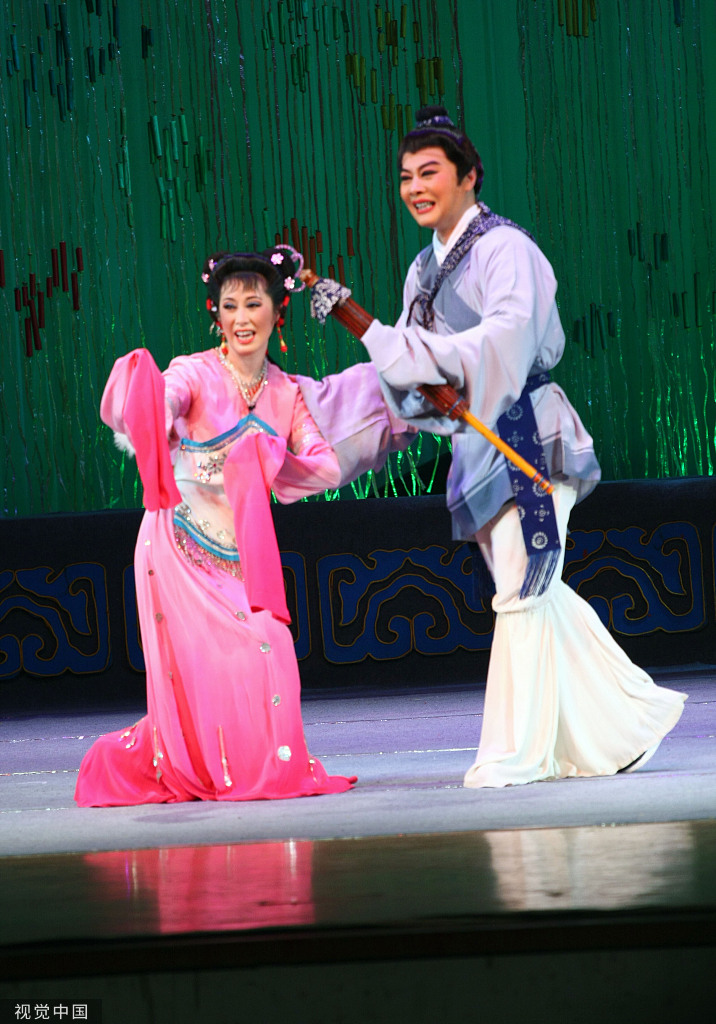
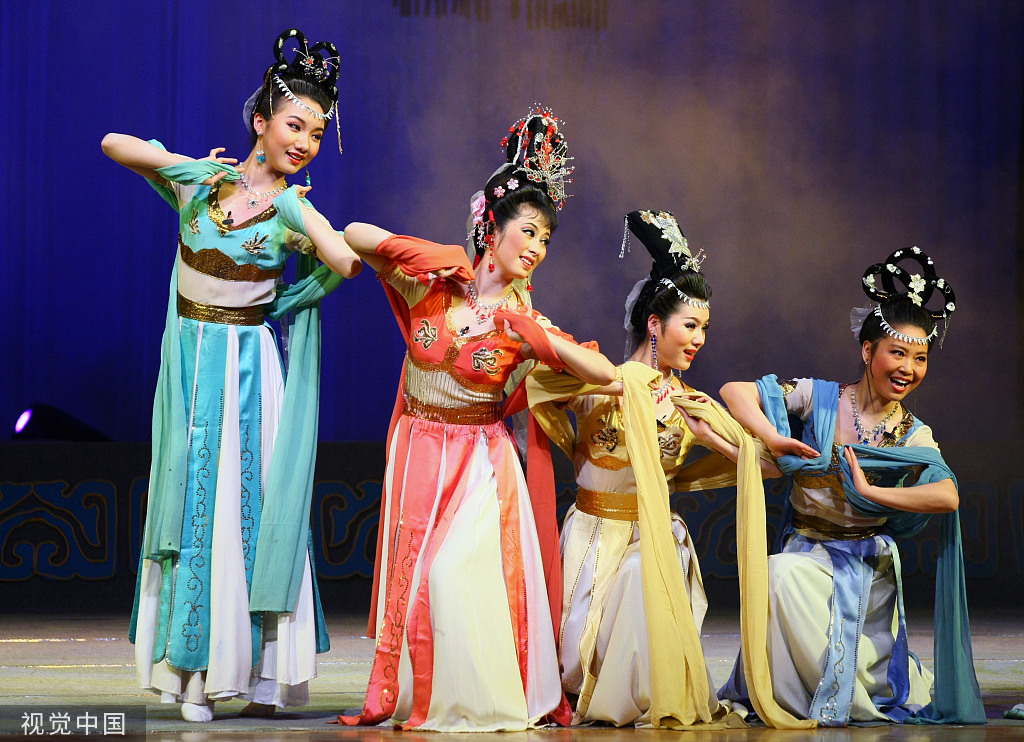
Otherwise known as Story of Brocade (Zhijin ji) and Hundred-Day Marriage (Bairi yuan), this story is based on a Chinese legend that existed in oral tradition before any written versions. It has since become a major subject of several Chinese operas, films and TV series. The seven daughters of the Jade Emperor travel to the mortal world. During the stay, one of them falls in love with Dong Yong. He is a poor worker who had sold himself into servitude to pay for his father's funeral. The youngest daughter feels sympathetic for him, as he lives on the earth. She therefore comes down from heaven to earth to marry Dong, but without permission of her father. With help of her sisters, she manages to weave ten pieces of brocade for Dong Yong to pay off his debt, shortening his indenture to 100 days. Before the couple can begin their life together, the Jade Emperor orders his daughter to return home which finally ends the prospect of marriage.
The Cowherd and Weaver Girl (Niulang zhinv)

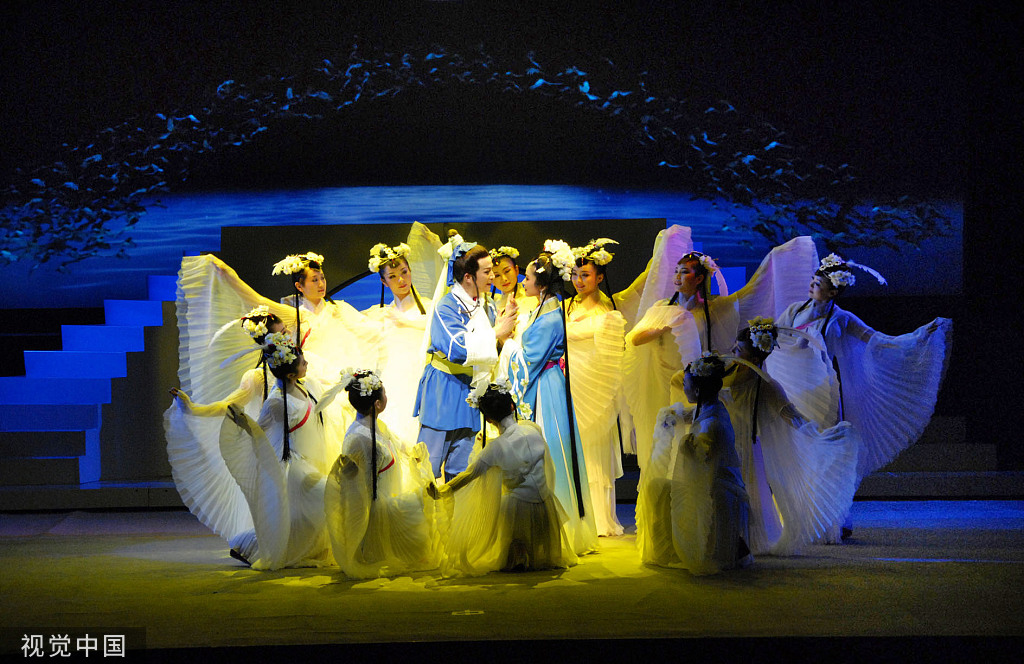
The tale of the cowherd and the weaver girl is a love story between Zhinv (the weaver girl, symbolizing the star Vega) and Niulang (the cowherd, symbolizing the star Altair). Their love was not allowed, thus they were banished to opposite sides of the heavenly river (symbolizing the Milky Way). Once a year, on the 7th day of the 7th lunar month, a flock of magpies form a bridge to reunite the lovers for one day. There are many variations of the story.
The earliest-known reference to this famous myth dates back to over 2,600 years ago, and was told in a poem from the Book of Songs (Shi jing). The tale of the cowherd and the weaver girl has been celebrated in the Qixi Festival in China since the Han dynasty.
Emperor’s Female Son-in-Law (Nv fuma)
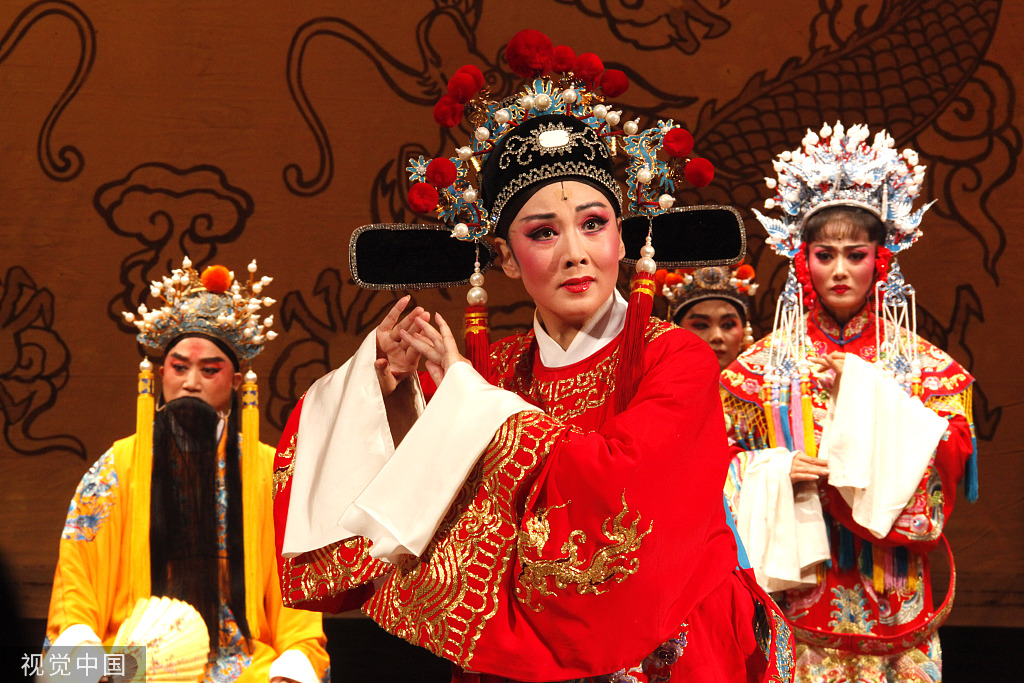
Feng Suzhen was engaged to Li Zhaoting in her childhood. After the ruin of the Li family, Li Zhaoting lodged himself at the Feng Residence. Because of his poverty, Feng Suzhen's parents rejected him, and, what was worse even brought a false charge of theft against him. He was put into prison and Suzhen was forced to marry a business magnate. She did not submit herself to the arrangement and dressed up as a young man. Suzhen ran away from her hometown and then participated in the national examination by assuming the name of her fiancé, Li Zhaoting. It never occurred to her that she would be named the number one scholar, but she was. The Emperor formed such a good impression of her that he intended to make her his son-in-law. Suzhen was not permitted to refuse. She had to obey the demand and went to the palace to get married to the princess.
On the wedding night, Suzhen told the princess of the truth at risk of death. The princess was moved deeply. The next day, at the imperial court, Suzhen won the Emperor’s absolution because of her intelligence. In addition, her fiancé Li Zhaoting was released from the prison. From then on, the couple led a happy life.




